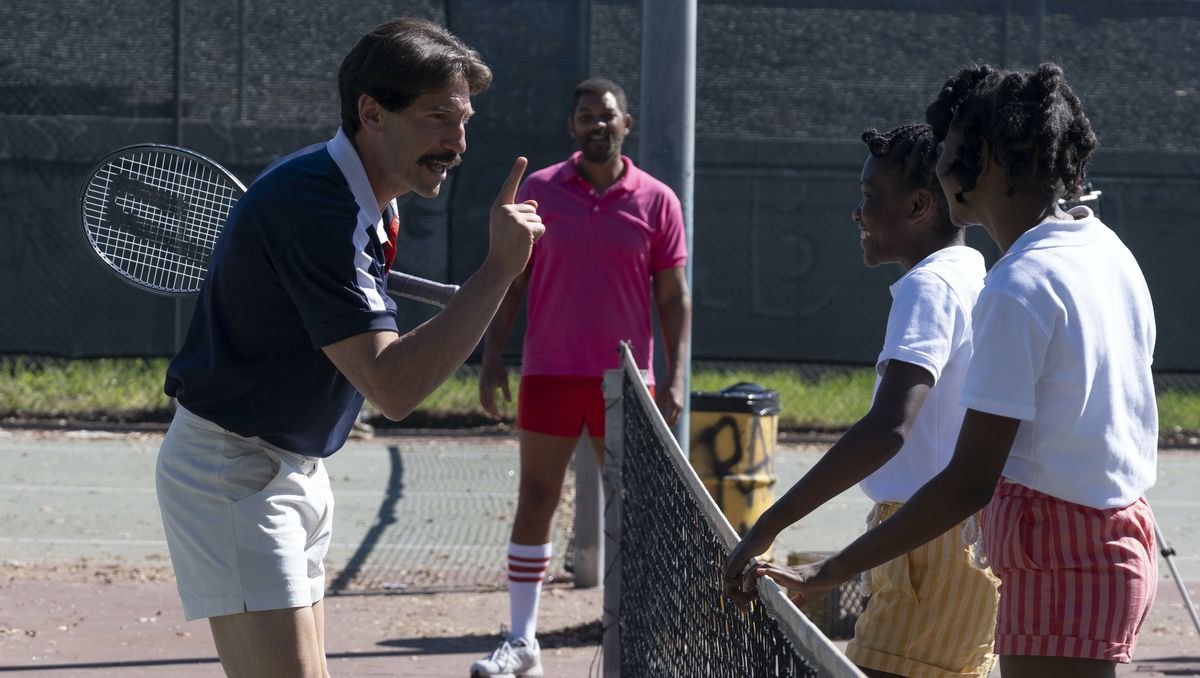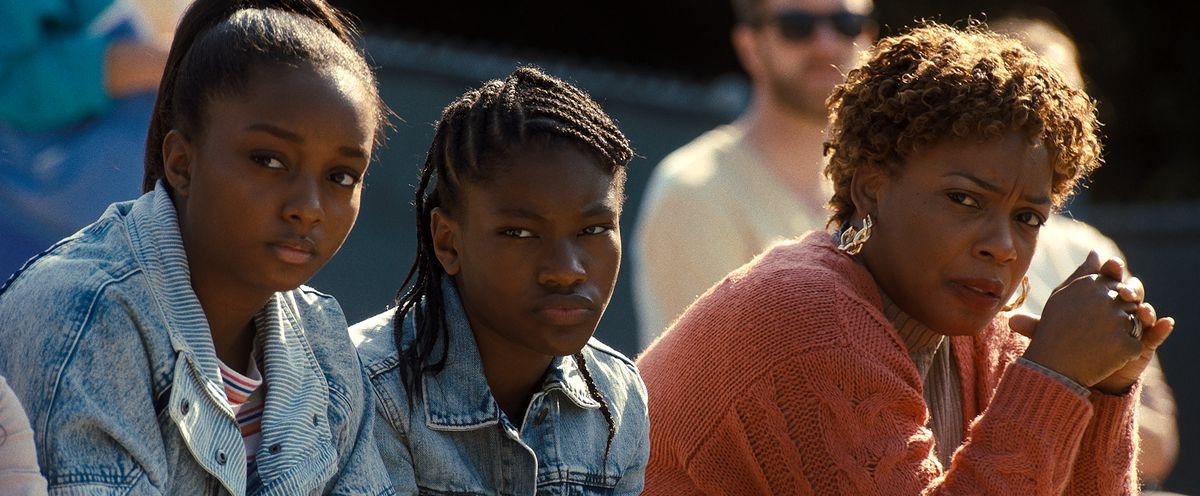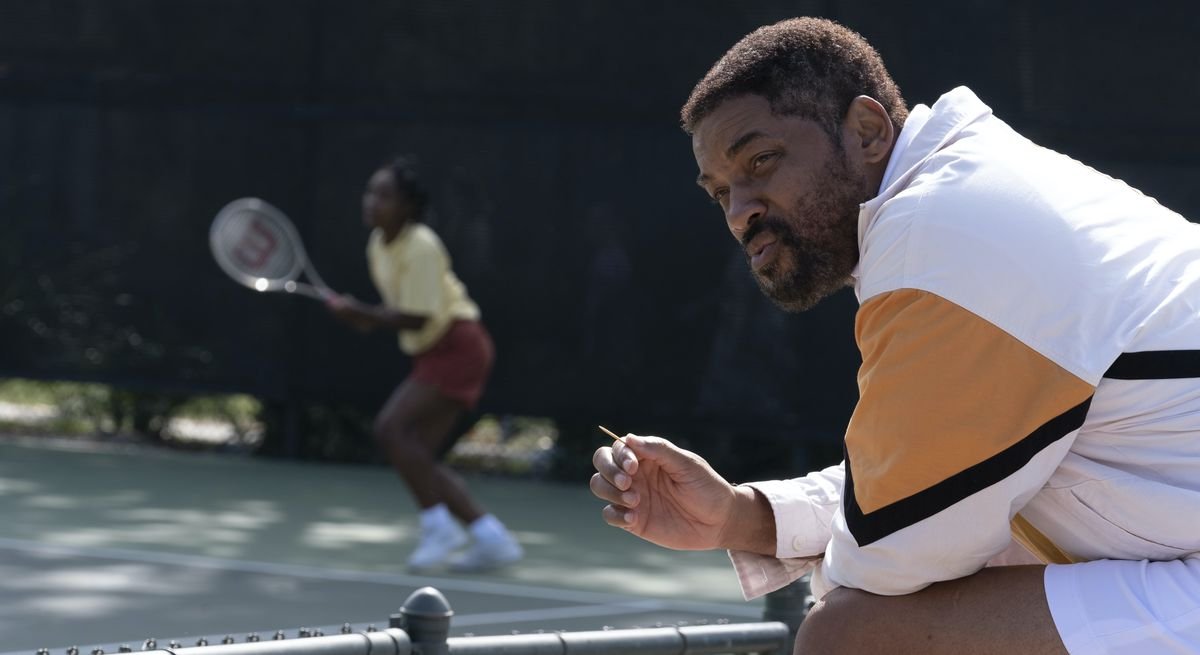In Reinaldo Marcus Green’s charming, well-acted inspirational sports film King Richard, Richard Williams (Will Smith) shows Walt Disney’s Cinderella to his tennis-prodigy daughters, Venus (Saniyya Sidney) and Serena (Demi Singleton). Venus has just finished wiping the floor with a rival en route to winning another junior tennis competition. Williams doesn’t take kindly to what he perceives as Venus bragging about beating a white girl. He shows his daughters Cinderella because the film, in his mind, teaches humbleness and dignity. To Williams, a Black man who grew up in Louisiana, humility and docility is how Black folks survived in the white-dominated South.
Zach Baylin’s script, unfortunately, doesn’t fully explicate the complicated, internal politics working within Williams. This film, without explicitly saying so, is a version of events approved by the real-life Williams family. That leads to friction between the glossy, wholesome triumphs common to most sports biopics, and the uneasy interrogation needed for a character like Williams, a vain leader who’s guiding his daughters toward tremendous triumphs, while feeding them uncomfortable and even disturbing messages. That push and pull between frankness and a spin that flatters Williams keeps Green’s King Richard from being a truly great film. But it doesn’t inhibit it from being enjoyable. It’s tonally conflicted, but it’s an oddly compelling piece about an unlikely Black family succeeding in a white-dominated space.

Photo: Chiabella James/Warner Bros.
King Richard begins in Compton, California. Richard, Oracene (a captivating Aunjanue Ellis), and their five daughters live in a modest, crime-riddled neighborhood. Oracene works double shifts as a nurse, while Richard trains Venus and Serena during the day, and works as a security guard at night. Richard knows his daughters are talented — he believes he’s training up the next two Michael Jordans. But Compton’s downtrodden surroundings provide few facilities, and lack the institutional or community support required to mold champions. So Richard spends many of his days promoting his two prodigies: He makes a corny, low-budget promotional video, makes up a booklet about their potential, and stalks the upper-crust country clubs, searching for an investor.
Green’s film follows several familiar inspirational sports motifs, especially some seen in Randall Wallace’s Secretariat. In both films, the protagonist ignores conventional wisdom in lieu of their own instincts, believing success lurks just around the corner if they keep with their plan. The villainous obstacles in this narrative are the nonbelievers. Richard and Oracene’s busybody neighbor routinely chastises them for how hard they work their daughters. The local gang members catcall Williams’ eldest daughter, Tunde (Mikayla LaShae Bartholomew). In one odd scene, Williams comes close to killing one of the gangbangers, but a brutal twist of fate intercedes on his behalf. How the audience is supposed to emotionally read a Black teen suffering due to cyclical violence isn’t altogether clear.
The film doesn’t shy away from Williams as both a control freak and a huckster. When Paul Cohen (Tony Goldwyn) becomes the girls’ trainer, he grates against Williams’ insistence that Venus and Serena use an open stance, especially since Williams’ scant tennis knowledge comes from the multiple nights he stays up reading tennis magazines or listening to instructional audiotapes. They butt heads even more when Williams decides to pull the girls off the junior tournament circuit. Most of the time, Williams is acting from a place of love: He doesn’t want his daughters burning out under the weight of competition. King Richard somewhat critiques the pressures piled onto sports children, especially by their parents, by showing a montage of tennis kids berating themselves for not succeeding.

Photo: Warner Bros.
Even so, the first hour of King Richard is shaky, mostly because it relies too heavily on Williams’ perspective without actually inspecting him. His outlook on Black folks entering white spaces seems fascinating: He openly believes his daughters shouldn’t make waves, and shouldn’t trust the private, luxurious country clubs where they end up. But Green leaves that tension on the surface. The same goes for any consideration of whether Williams is abusing his kids by pushing them so relentlessly. He talks about wanting Venus and Serena to just be kids, but when are they ever just kids? The most relevant and potentially emotional scenes aren’t seen, merely talked about.
King Richard doesn’t lock in until its second half, when the film becomes more an ensemble than Williams’ story. Sidney and Singleton are given meatier scenes for their affableness to shine through. Jon Bernthal as the girls’ second trainer, Rick Macci, is a fireball of energy fueled by short-shorts, thunder thighs, and a lightning mustache. Ellis has a couple of show-stopping scenes where she takes Williams to task for his selfishness.
The intensity swimming in Ellis’ eyes, her naturalism, approaching the character not as a caricature but a real person, contrasts greatly with Will Smith, who balances his charming movie-star persona with broader character beats. Smith’s decisions don’t always work: His accent often slips, and the hunched shape he gives his body too often allows the seams of his performance to show. The best portions for Smith always occur when he’s relying on his easy wit. The worst portions occur when he tries to bring across Richard Williams’ contradictory racial politics. He plays both Williams’ subservience and his rebellion at a surface level.

Photo: Warner Bros.
Cinematographer Robert Elswit shoots the tennis matches in a claustrophobic fashion, positioning the camera exclusively behind the serving player. That decision takes the excitement out of the tennis. Richard Loncraine’s rom-com Wimbledon took a different tack, using full and establishing shots to contextualize the action. Viewers could see the ball travel, the players’ movement, and the gamesmanship of the shots. Such pleasures elude King Richard.
Multiple competing interests are pulling on this film: The need to sanitize Williams’ image, the desire to make an already inspirational story more mainstream. King Richard never delves into the grittier side of racial dynamics, instead remaining at arm’s length while quickly moving past references to Rodney King or the Jim Crow South. The more interesting movie would probably be told from Venus and Serena’s perspective.
But in spite of those shortcomings, the beguiling draw of this rags-to-riches story can’t be denied. Smith’s immense movie-star presence can’t be ignored. And the other crowd-pleasing performances, are delightful, complete with a bevy of open-hearted one-liners. Green’s King Richard isn’t a great movie, but it doesn’t need to be when the characters are this warm, and its message is so earnest.
King Richard debuts in theaters and on HBO Max on Nov. 19. It will stream exclusively on HBO Max through Dec. 19.
























































